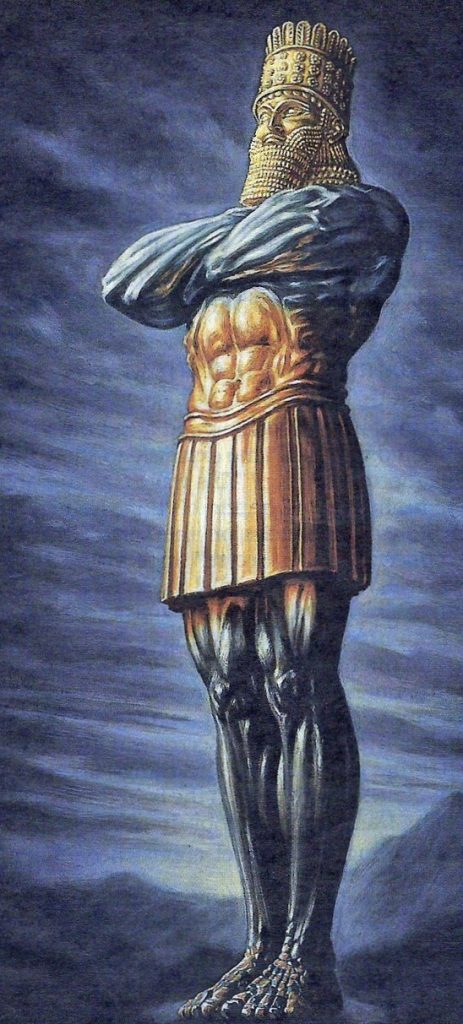The book of Daniel the prophet introduces a panorama of world empires. The prophecy in chapter 2 helps us see the big picture. We can even reach out and touch the kingdom of God. Let’s take a brief journey in the famous chapter 2 of this prophetic book.
Introduction
In 605 BC, King Nebuchadnezzar of Babylon attacked and overthrew Jerusalem. Nebuchadnezzar took a significant number of Hebrew youth captive. One of his captives was Daniel. The second chapter of the book of Daniel opens with a dream of the Babylonian king Nebuchadnezzar: “Now in the second year of Nebuchadnezzar’s reign, Nebuchadnezzar had dreams; and his spirit was so troubled that his sleep left him” (Daniel 2:1).
The king knew that his dream had unusual significance, but he could not remember it. He called the wisest men of his realm together for an explanation. They too could neither recall the king’s forgotten dream nor explain its significance. Infuriated, the king threatened them with death.
When a prophet steps forward
At this crisis moment Daniel stepped forward. He graciously requested time to pray about the unsolved mystery. God intervened. Heaven’s mystery was revealed.
The content of the dream is obvious from Daniel’s prayer of thanksgiving. It reveals a God who “changes the times and the seasons; removes kings and raises up kings. . . . He reveals deep and secret things” (verses 21, 22). Since “wisdom and might” (verse 20) are His, God not only knows the future, but is the architect of the future. Bible prophets do not speculate about the future. They do not guess about what might be coming. In the Scriptures they reveal to us what God has revealed to them.
A great image


This huge metallic image had a head of gold, breast and arms of silver, thighs of brass, legs of iron, and feet of iron and clay (verses 31–33). The climax of the king’s dream is a massive stone descending from heaven, striking the image on its feet, and finally becoming a mountain that fills the whole earth.
What does it mean?
Think of how amazed the ancient king must have been when the prophet Daniel described the minute details of his dream. The king’s next question must have been “Daniel, what does all of this mean?” Daniel’s explanation of the dream’s meaning is just as precise as his description of the dream’s content.
He begins the explanation with these words:
“You are this head of gold. But after you shall arise another kingdom inferior to yours; then another, a third kingdom of bronze, which shall rule over all the earth. And the fourth kingdom shall be as strong as iron” (verses 38–40).
According to God’s interpretation through the prophet Daniel, each metal represents a world-dominating empire. The dream depicts the rise and fall of nations.
Babylon
Daniel identifies Nebuchadnezzar’s kingdom of Babylon with these words: “You are this head of gold” (verse 38).
The Babylonian Empire ruled the Middle East and extended its dominion throughout the Mediterranean Basin from 605 BC to 539 BC. Gold is a fitting symbol of Babylon. Babylon’s chief god, Bel Marduk, was symbolized in a statue of pure gold. This golden image of Bel Marduk sat in a golden-domed temple on a golden throne beneath a golden candlestick before a golden table.
Babylon’s lifestyle of luxurious living led Jeremiah the prophet to call Babylon “a golden cup in the Lord’s hand” (Jeremiah 51:7).
This incredible prophecy in Daniel 2 reveals that Babylon would not rule forever. “Another kingdom” symbolized by the breast and arms of silver would arise.
Media-Persia
During a night of drunken debauchery a mysterious hand wrote these words on Babylon’s palace wall: “God has numbered your kingdom, and finished it. You have been weighed in the balances, and found wanting. Your kingdom has been divided and given to the Medes and Persians” (Daniel 5:26–28).
There is no guesswork or speculation here. The kingdom that followed Babylon was Media-Persia. Both the Bible and history verify this fact. The famed Cyrus Cylinder housed in the British Museum records the Persian general’s attack on Babylon.
Greece
The breast and arms of silver (Media-Persia) were overcome by a third empire of bronze. What nation successfully conquered Media-Persia? The Medes and Persians ruled from 539 BC to 331 BC. They were defeated by the Greeks.
The brilliant Greek general Alexander the Great led the Greek armies to victory. Daniel 8 describes the Greeks by name as vanquishing the Media-Persians. Both the Scriptures and history agree.
Rome
The Greeks ruled from 331 BC to 168 BC, when they were defeated by the iron monarchy of Rome.
During the Roman rule of the Caesars, Jesus was born. A Roman governor tried Jesus, and Roman soldiers crucified Him. The Romans ruled from 168 BC to approximately AD 351.
Four metals: gold, silver, bronze, and iron. Four dominant world empires: Babylon, Media-Persia, Greece, and Rome. Did a fifth nation overthrow Rome?
A fifth empire?
Was Rome conquered by another more powerful political power? Certainly not. Rome was overcome by the Germanic barbarian tribes from the north. Listen to these remarkable words from the prophecy: “Whereas you saw the feet and toes, partly of potter’s clay and partly of iron, the kingdom shall be divided” (Daniel 2:41).
History has followed prophecy like a builder follows an architect’s blueprint. The Roman Empire was divided and remains divided to this day. The prophecy continues with these insightful words making clear that Europe will never fully unite:
“They will not adhere to one another, just as iron does not mix with clay” (verse 43).
Would-be world rulers have tried to revive the Roman Empire. Each passing century marks the fulfillment of this ancient prophecy. Charlemagne, Charles V, Napoleon, Kaiser Wilhelm, Hitler, Mussolini, and Stalin all attempted to unite Europe through either intermarriage or political conquest. The independent nations of Europe, even more with the Brexit situation, speak eloquently of a God who is in control of history, a God who guides the destiny of the nations.
The everlasting kingdom
The prophecy comes to an incredible climax in Daniel 2:44.
“And in the days of these kings the God of heaven will set up a kingdom which shall never be destroyed; and the kingdom shall not be left to other people; it shall break in pieces and consume all these kingdoms, and it shall stand forever.”
According to this remarkable prophecy the next event on heaven’s timetable is Jesus Christ, the Rock of Ages, that Rock cut out without hands, setting up His eternal, everlasting kingdom.
The kingdoms of this earth are temporary. God’s kingdom will last forever. The reign of earthly kings is short-lived. The reign of Jesus is eternal.
This article is taken from chapter “Prophecy’s Big Picture”, an excerpt from Hope Beyond Tomorrow, written by Mark Finley.






















